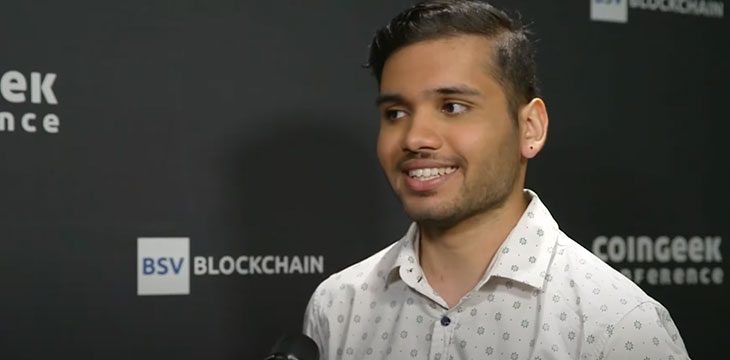|
Getting your Trinity Audio player ready...
|
Codugh won the Bitcoin SV Hackathon in Seoul in 2019. Two years later, its co-founder and CEO Shashank Singhal took the stage in this year’s CoinGeek Conference in New York to talk about the latest on the application programming interface (API) platform that allows users to call APIs in an on-demand pay-per-use process implemented via microtransactions.
Shashank joined CoinGeek Backstage host Nidhi Arora on the sidelines of the New York conference, and he shared his journey from winning the 2nd Bitcoin SV Hackathon in Seoul to the latest movement his team has for Codugh.
Nidhi started by asking Shashank how he felt presenting the platform at the CoinGeek Conference New York. “It’s been really busy but it’s been really rewarding. We’ve been working hard over the last two years to achieve a lot of what we’ve achieved, and I’m really happy about where we are today,” Shashank said.
Codugh recently applied for a digital exchange license in Australia—a long process since Shashank said they had to deal with different authorities for approvals, and there was the additional challenge of the pandemic.
“We currently hold licenses as a digital exchange and as a remittance service provider in Australia. That allows us to deal with a lot of regulations and then make sure that we have to keep our AML/CTF policies up to a really high standard. Which you sort of need when you run a digital currency business,” Shashank said.
“It certainly was very challenging. It took us a very long time. We had to deal with a lot of different authorities. We had to build programs, get approvals, and some of them had long wait times. Sometimes even further extended because of COVID. It’s been a long time, but I’m glad we’re here now,“ he added.
What has the platform resolved so far? Like any other application on Bitcoin SV, the platform encountered its share of challenges. However, that didn’t stop the Codugh team from continuously improving and developing the platform. Shashank said Codugh’s original vision is to create economic opportunities for developers. “As we’ve continued to build, we’ve learned that we can use microtransactions and a lot of technology that we’ve already built to sort of build-out into technology after technology and help create opportunity for any technologists around the world. That’s our goal moving forward,” he explained.
Codugh allows users to call APIs in a ‘pay-per-use’ process implemented via microtransaction. It works by coding the API and then uploading it to the Codugh API marketplace. Once uploaded, the secondary developers can search, find, and call the API through Codugh’s gateway. Then if returned successfully, the gateway instantly bills the secondary developer and the microtransaction payments are sent to the primary developer.
“Recently we’ve just introduced and are about to release a microtransaction token. It’s a BSV-based token which allows users to pay essentially enough in a fiat currency but still use microtransactions to use BSV as a payment processor behind the scenes. That’s really cool, and we’re really excited about that,” Shashank said.
Nidhi closed the interview by asking what Shashank’s general key takeaway was for the viewers. He told them to check out Codugh and to “ask any questions or queries so we can keep improving and keep building upon ourselves.”
Watch: CoinGeek New York presentation, Micropayments for the World: APIs, Tokens and Computation

 03-03-2026
03-03-2026 




